人教版9年级英语第六单元知识点归纳
人教版英语九年级全册单元unit 6 知识点+测试卷+思维导图
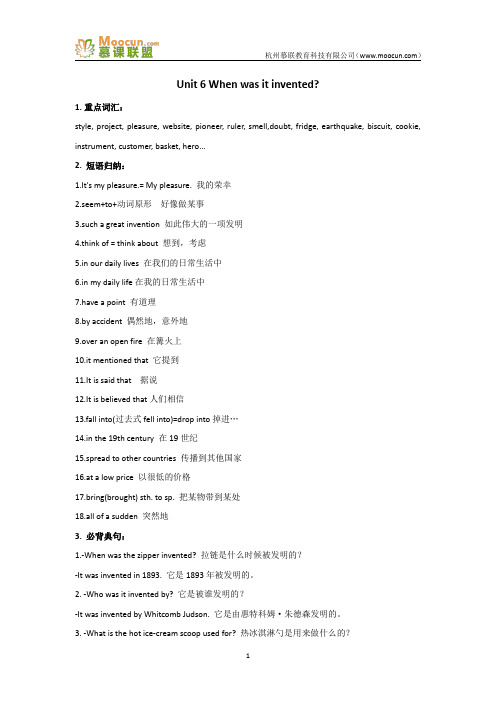
Unit 6 When was it invented?1.重点词汇:style, project, pleasure, website, pioneer, ruler, smell,doubt, fridge, earthquake, biscuit, cookie, instrument, customer, basket, hero...2. 短语归纳:1.It's my pleasure.= My pleasure. 我的荣幸2.seem+to+动词原形好像做某事3.such a great invention 如此伟大的一项发明4.think of = think about 想到,考虑5.in our daily lives 在我们的日常生活中6.in my daily life在我的日常生活中7.have a point 有道理8.by accident 偶然地,意外地9.over an open fire 在篝火上10.it mentioned that 它提到11.It is said that 据说12.It is believed that人们相信13.fall into(过去式fell into)=drop into掉进…14.in the 19th century 在19世纪15.spread to other countries 传播到其他国家16.at a low price 以很低的价格17.bring(brought) sth. to sp. 把某物带到某处18.all of a sudden 突然地3. 必背典句:1.-When was the zipper invented? 拉链是什么时候被发明的?-It was invented in 1893. 它是1893年被发明的。
2. -Who was it invented by? 它是被谁发明的?-It was invented by Whitcomb Judson. 它是由惠特科姆·朱德森发明的。
人教版九年级英语全一册知识梳理第六单元《Unit 6 Section A》
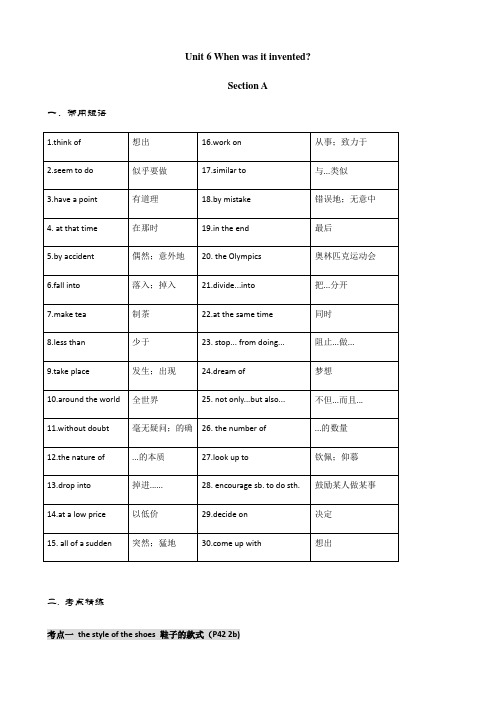
Unit 6 When was it invented?Section A一.常用短语二.考点精练考点一the style of the shoes 鞋子的款式(P42 2b)(1)style词性_________,意为__________。
常用短语in style意为“时髦的”,其反义短语为_____________,意为“过时的”。
名词/“样式;款式”/out of style☑ This year's style in dresses is different from last year's.今年的裙子样式与去年的不同。
☑ Her clothes are always in style.她的衣服总是很时髦。
(2)style 做名词,还可意为___________。
“方式”☑ Our children need new learning styles.我们的孩子需要新的学习方式。
考点二With pleasure! 非常愿意!(P42 2d)pleasure词性_________,意为___________。
名词/“高兴;愉快”☑ Watching the 2016 Summer Olympics gave him great pleasure.观看2016年夏季奥运会给他以极大的愉悦。
【辨析】with pleasure与my pleasure☑-Could you help me with my English?你能帮我学习英语吗?-With pleasure.当然可以。
☑ Thanks for helping me.谢谢你帮助了我。
-My pleasure./It's a pleasure.别客气。
考点三Think about how often it's used in our daily lives. 想想看,在我们的日常生活中它被使用得多么频繁。
(P42 2d)daily此处词性为_________,意为___________。
人教版9年级英语第六单元知识点归纳

精心整理九年级上册第6单元考情分析:本单元还是在讲被动语态,主要在单选中与动词时态混合考查,在写作与阅读中也常会用到。
A.不知道或没有必要说明动作的执行者是谁时.We haven’t been told about it.没人通知我们这件事B.强调动作的承受者(这时可带由by引起的短语)The book was written by Mo Yan.C.不愿说出动作的执行者是谁He was asked to give a speech about how to study English well.3.被动语态的注意事项:A. there be 结构没有被动语态B.主句中宾语是反身代词的没有被动语态7.fall into落入,陷入。
比较容易搞混淆的还有:fall down摔倒,fall off掉下,fall asleep入睡8.辨析:remain是动词,保持不变/仍然是;remind动词,提醒,remind to do sth,remind···of。
9.辨析:【了解】家;translation名词,翻译15.all of a sudden突然,猛地=suddenly16.by mistake无意中,错误地17.much-loved 深受喜爱的,复合形容词18.divide···into···把····分成·····19.stop···from···阻止····做····20.dream of/about 梦想···向往···· (of/about是介词,后面的动词用-ing 形式)21.look up to 倾佩/仰慕/抬起头看练习:(15年上海中考)以“I want to invent ______"为题,写一篇不少于60个词的短文,标点符号不占格参考词汇:1.It can be used to ...with the help of our robot doctors,?you can talk to your personal doctor one to one whenever you want.In short, family doctor robots can?make great contribution to?our society.精彩亮点分析:亮点一:全文巧用“first, furthermore, in short”等连接词,把家庭机器人医生的好处写的非常清晰,让阅卷老师一目了然。
最新人教版9年级英语第六单元知识点归纳

黄金笔记6九年级上册第6单元考情分析:本单元还是在讲被动语态,主要在单选中与动词时态混合考查,在写作与阅读中也常会用到。
1.讲解:一般过去时被动语态的基本构架:was /were+ P.P.(本单元语法)现将动词的被动语态归纳如下——2.被动语态在什么情况下使用?A.不知道或没有必要说明动作的执行者是谁时.We haven’t been told about it.没人通知我们这件事B.强调动作的承受者(这时可带由by引起的短语)The book was written by Mo Yan.C.不愿说出动作的执行者是谁He was asked to give a speech about how to study English well.3.被动语态的注意事项:A.there be 结构没有被动语态B.主句中宾语是反身代词的没有被动语态C.不及物动词没有被动语态1.invent 动词,发明;inventor 名词,发明家;invention 名词,发明2.【了解】在英语中,除了名词所有格“XX’s”表示“···的”之外,of也有“···的”意思。
比如the style of,意为“···的样式/风格”,the popularity of,意为“···的普及”3.in style流行的,时髦的;out of style过时的4.make a list列清单5.it is said that,据说···常见的类似词组还有it is believed that···人们认为···;it is reported that···据报告···;it is known that···众所周之···;it is supposed that···据猜测···6.by accident =by chance 偶然地,意外地7.fall into落入,陷入。
人教版英语9年级上册第6单元sectionB知识点总结

篮球是由出生于1861年的加拿大医生詹姆斯·奈史密斯发明的。。
Canadian
adj. 加拿大的;加拿大人的 n. 加拿大人 Cana1861. 非限制性定语从句。 先行词是人关系词用who
popular
adj. 受欢迎的
7. The number of foreign players, including Chinese players, in the NBA has increased. p46
包括中国球员在内的NBA外籍球员数量有所增加.
including 介词. 包含;包括
include v. including 介 included adj.
A.into B. in C. on D. onto
1. We are going to divide the class__D__small groups.
A.to B. in C. of D .into
2. He lived in place ____D______ Gum Tree.
A.called B. name C. named D. Both A and C
这些明星鼓励年轻人努力工作来实现他们的梦想。
encourage sb. to do sth. 鼓励某人做某事
achieve v. 完成;实现
achieve one's dream 实现梦想
Exercises 1. -__D___boys come to swim. Do you know_____ of them?
这台冰箱以低价出售。
look up to 钦佩;仰慕;抬头看
人教版英语九年级全一册第六单元重点短语归纳

the Olympics奥林匹克运动会
divide...into...把……分成……
at the same time同时
stop...from doing...阻止……做……
dream of = dream about梦想;向往
not only...but also...不但……而且……
the number of...……的数量
a number of...大量的……
look up to钦佩;仰慕
achieve one’s dream实现某人的梦想
take notes记笔记
lead to导致
at a low price以低价
translate...into...把……翻译成……
all of a sudden突然;猛地
work on从事;致力于
by mistake错误地;无意中
in the end最后
a cook called George Crum = a cook named George Crum一个名叫乔治·克拉姆的厨师
九年级全一册第六单元重点短语归纳
the style of...……的样式
have a point有道理
by accident = by chance偶然;意外地
make tea泡茶
be used for被用于……
think of = think about想;考虑
fall into落入;陷入
in our daily life在我们的日常生活中
some time一段时间
around the world = all over the world全世界
the nature of……的本质
九年级英语第六单元知识点人教版
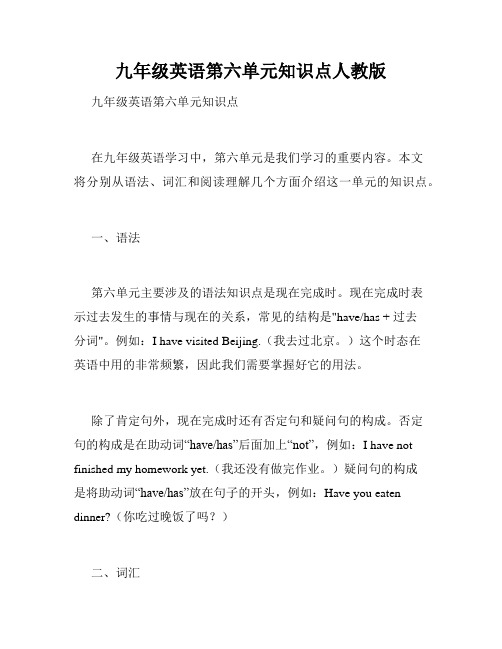
九年级英语第六单元知识点人教版九年级英语第六单元知识点在九年级英语学习中,第六单元是我们学习的重要内容。
本文将分别从语法、词汇和阅读理解几个方面介绍这一单元的知识点。
一、语法第六单元主要涉及的语法知识点是现在完成时。
现在完成时表示过去发生的事情与现在的关系,常见的结构是"have/has + 过去分词"。
例如:I have visited Beijing.(我去过北京。
)这个时态在英语中用的非常频繁,因此我们需要掌握好它的用法。
除了肯定句外,现在完成时还有否定句和疑问句的构成。
否定句的构成是在助动词“have/has”后面加上“not”,例如:I have not finished my homework yet.(我还没有做完作业。
)疑问句的构成是将助动词“have/has”放在句子的开头,例如:Have you eaten dinner?(你吃过晚饭了吗?)二、词汇第六单元的词汇主要包括动词短语和名词短语。
例如,动词短语“look forward to”意思是“期待”,在句子中常用于表示期待将要发生的事情,例如:I am looking forward to the summer vacation.(我期待着暑假。
)名词短语“field trip”意思是“实地考察”,也可用作动词短语,表示“实地考察”。
词汇的积累是学习英语的基础,我们可以通过阅读、听力、写作等多种方式来扩大词汇量。
记忆词汇时,可以运用词语联想、造句等方法,提高记忆效果。
同时,多做一些词汇练习题也能够帮助我们记忆和掌握这些单元的词汇。
三、阅读理解在阅读理解方面,第六单元的重点是阅读理解技巧的提升。
我们需要学会如何从文章中获取信息、理解作者的意图以及推断词义。
对于这些技巧的提升,我们可以通过多读英文文章来培养,增加阅读量,从而提高阅读能力。
此外,我们还可以运用一些阅读理解策略来帮助我们更好地理解文章。
比如,可以先快速浏览文章的标题和每个段落的开头句子,从而获取文章的大意;可以使用问题预测法,先读问题,再带着问题去读文章,找到问题的答案等。
【人教版】九年级英语课文单词知识点精讲第六单元ppt
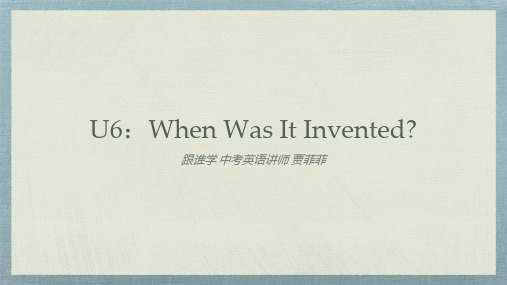
electricity n. 电;电能
style n. 样式款式
Different people have different learning styles.
What should I do for Project Hope?
project n. 项目;工程
pleasure n. 高兴;愉快 you here.
It’s my pleasure to introduce myself to
zipper n. (=zip) 拉链;拉锁 clothes? daily adj. 每日的;日常的 worldwide. have a point 有道理 website n. 网站
How many zippers can you see on your There are around 8000 daily newspaper
Did she mention where she was going? I didn’t think our meeting was
accidental adj. 意外的;偶然的 accidental.
by accident 偶然;意外地
nearly adv. 几乎;差不多
We met by accident at the airport.
look up to 钦佩;仰慕
hero n. 英雄;男主角
These students look up to their teachers.
A hero goes out of his way for someone.
professional adj. 职业的;专业的
He is a professional singer.
You have a point.
人教版9年级英语第六单元知识点归纳

黄金笔记6九年级上册第6单元考情分析:本单元还是在讲被动语态,主要在单选中与动词时态混合考查,在写作与阅读中也常会用到。
1.讲解:一般过去时被动语态的基本构架:was /were+ P.P.(本单元语法)现将动词的被动语态归纳如下——2.被动语态在什么情况下使用?A.不知道或没有必要说明动作的执行者是谁时.We haven’t been told about it.没人通知我们这件事B.强调动作的承受者(这时可带由by引起的短语)The book was written by Mo Yan.C.不愿说出动作的执行者是谁He was asked to give a speech about how to study English well.3.被动语态的注意事项:A.there be 结构没有被动语态B.主句中宾语是反身代词的没有被动语态C.不及物动词没有被动语态1.invent 动词,发明;inventor 名词,发明家;invention 名词,发明2.【了解】在英语中,除了名词所有格“XX’s”表示“···的”之外,of也有“···的”意思。
比如the style of,意为“···的.样式/风格”,the popularity of,意为“···的.普及”3.in style流行的,时髦的;out of style过时的4.make a list列清单5.it is said that,据说···常见的类似词组还有it is believed that···人们认为···;it is reported that···据报告···;it is known that···众所周之···;it is supposed that···据猜测···6.by accident =by chance 偶然地,意外地7.fall into落入,陷入。
人教版英语9年级上册第6单元sectionA知识点总结

lock v. 锁上
n. 锁子
10. The earthquake happened all of a sudden, but luckily the villagers were brought to a safe place. p44
地震是突然发生的,但幸运的是村民们被带到了安全的地方。
all of a sudden sudden suddenly
Unit 6 When was it invented?
section A
英语动词有两种语态: 主动语态 (the Active Voice) 被动语态 (the Passive Voice)
A. 主动语态表示主语是动作的执行者。
We planted the tree.
B. 被动语态表示主语是动作的承受者。
突然 adj. adv.
突然的 突然地
all of a sudden = suddenly
Exercises
1. Edison , a great __i_n_v_e_n_t_o_r__, _in_v_e_n__te_d__over 1’000 i_n_v_e_n__ti_o_n_s_ all his life.(invent)
8. Different writers translated the book into different languages. p44 不同的作家把这本书翻译成不同的语言。
translate into 把......翻译成......
9. The door was locked when we arrived, so we rang the bell. p44 我们到的时候门是锁着的,所以我们按了门铃。
The tree was planted by us.
人教版九年级英语全一册知识点Unit6知识点总结

Unit 6 When was it invented? 重点知识归纳解析【重点单词】1. project n. 项目,工程;2. pleasure n. 高兴,愉快;3. daily adj. 日常的,每日的;4. mention v. 提到,说到;5. nearly adv.几乎,差不多;6. boil v. 煮沸,烧开;7. remain v. 保持不变;剩余;8. national adj.国家的,民族的;9. low adj.低的,矮的;10. translate v.翻译;11. lock v.锁上;n. 锁;12. sudden adj. 突然的13. crispy adj. 脆的;酥脆的;14. salty adj.咸的;15. sour adj.酸的,有酸味的;16. customer n.顾客。
17. Canadian 加拿大的,18. divide v.分开,分散;19. hero n英雄,男主角;20. professional adj. 职业的,专业的;【重点词组】1. shoes with special heels 特殊后跟的鞋子2. hot ice cream scoop 热的冰其淋勺子3. run on electricity 电动的4. be used for 被用作5. the subject for my school project 学校项目的课题6. our daily lives 我们的日常生活7. have a point 有点道理8. by accident 偶然,意外地9. over the open fire 在火堆上10. fall into the water 落入水中11. take place 发生12. without doubt 毫无疑问13. at a low price 以一个很低的价格14. translate the book into different language 把书翻译成不同种的语言15. all of sudden 突然16. by mistake 错误地17. a much-loved and active sport 一个深受喜爱并且积极的运动18. divide…into 把…分开19. stop sb from doing sth 阻止某人做某事20. look up to 钦佩,仰慕21. the professional basketball groups 职业篮球机构22. use someone else’s idea 借用其他人的想法【重点句式】1. I think the TV was invented before the car. 我认为电视是在轿车之前发明的。
人教版新目标九年级全册英语 Unit 6 单元语法知识点考点复习提纲
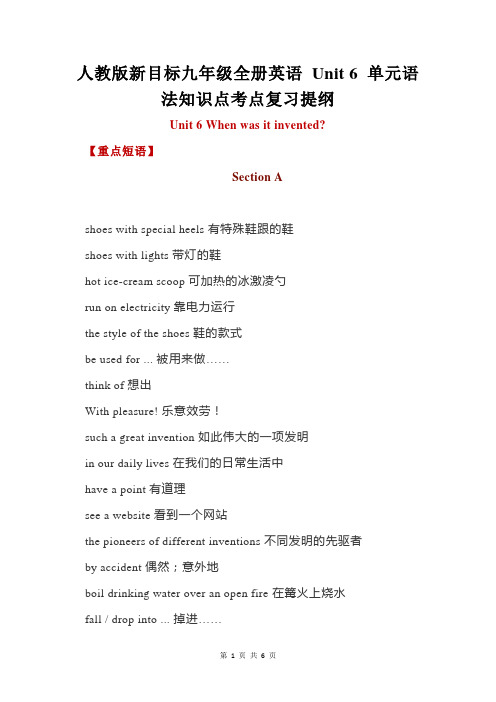
人教版新目标九年级全册英语Unit 6 单元语法知识点考点复习提纲Unit 6 When was it invented?【重点短语】Section Ashoes with special heels 有特殊鞋跟的鞋shoes with lights 带灯的鞋hot ice-cream scoop 可加热的冰激凌勺run on electricity 靠电力运行the style of the shoes 鞋的款式be used for ... 被用来做……think of 想出With pleasure! 乐意效劳!such a great invention 如此伟大的一项发明in our daily lives 在我们的日常生活中have a point 有道理see a website 看到一个网站the pioneers of different inventions 不同发明的先驱者by accident 偶然;意外地boil drinking water over an open fire 在篝火上烧水fall / drop into ... 掉进……produce a nice smell 产生一种香味the saint of tea 茶圣in less than 100 years 在不到一百年的时间里national drink 国饮take place 发生;出现tea culture 茶文化without doubt 毫无疑问;的确understand the nature of tea 了解茶的本质sell ... at a low price 低价卖……translate ... into ... 把……翻译成……all of a sudden 突然;猛地ring the bell 按门铃musical notes 乐符Section Bpotato chips 炸薯条;炸土豆片by mistake 错误地;无意中in the end 最后put lots of salt on ... 在……上面撒很多盐a much-loved and active sport 一种备受欢迎而且剧烈的运动more than 超过;多于in history 历史上a college teacher 一位大学老师divide ... into 把……分开get the ball in the other team’s basket把球投进对方篮筐at the same time 同时stop ... from doing ... 阻止……做……dream of 梦想;幻想;向往not only ... but also ... 不但……而且……the number of ... ……的数量look up to these basketball heroes 钦佩 / 仰慕这些篮球英雄encourage sb. to do sth. 鼓励某人做某事achieve their dreams 实现他们的梦想come up with 提出;想出lead to 导致【考点详解】1. invent v. 发明inventor n. 发明家invention n. 发明2. be used for doing 用来做…(是被动语态)(这个短语的考点有两点,一是used for的意思,二是for后面用动名词)Pens are used for writing. 笔是用来写的。
人教版九年级全一册英语Unit6单元语法知识点总结
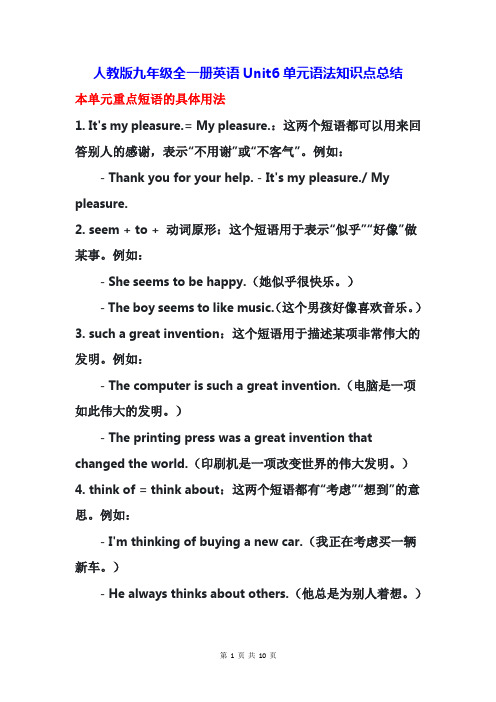
人教版九年级全一册英语Unit6单元语法知识点总结本单元重点短语的具体用法1. It's my pleasure.= My pleasure.:这两个短语都可以用来回答别人的感谢,表示“不用谢”或“不客气”。
例如:- Thank you for your help. - It's my pleasure./ My pleasure.2. seem + to + 动词原形:这个短语用于表示“似乎”“好像”做某事。
例如:- She seems to be happy.(她似乎很快乐。
)- The boy seems to like music.(这个男孩好像喜欢音乐。
)3. such a great invention:这个短语用于描述某项非常伟大的发明。
例如:- The computer is such a great invention.(电脑是一项如此伟大的发明。
)- The printing press was a great invention that changed the world.(印刷机是一项改变世界的伟大发明。
)4. think of = think about:这两个短语都有“考虑”“想到”的意思。
例如:- I'm thinking of buying a new car.(我正在考虑买一辆新车。
)- He always thinks about others.(他总是为别人着想。
)5. in our daily lives/ in my daily life:这两个短语用于描述在日常生活中的情况或活动。
例如:- Technology plays an important role in our daily lives.(科技在我们的日常生活中起着重要的作用。
)- In my daily life, I like to read books and exercise.(在我的日常生活中,我喜欢读书和锻炼。
人教版九年级英语第六单元Unit 6 section A+B知识点精讲

人教版九年级英语第六单元Unit 6 section A+B知识点精讲Section A单词1. style /staɪl/ n.样式;款式典例I like this style. 我喜欢这个样式。
短语in style流行的;时髦的out of style过时的2. project /'prɒdʒekt/ n.项目;工程助记人生无须大project(工程),快乐才是subject(主题),体验才是object(目标)典例an international science project国际科学项目Project Hope希望工程联想subject.主题object.目标3.pleasure /'pleʒə (r)/ n.高兴;愉快助记please(v.使愉快)去e+-ure(名词后缀)= pleasure典例to read for pleasure读书以自娱短语with pleasure当然了/很愿意for pleasure为了消遣;为了娱乐联想pleased adj.高兴的;满意的pleasing adj.令人高兴的;令人满意的谚语Pain past is pleasure.苦尽甘来。
4. daily /'deɪli/ adj.每日的;日常的助记day(n.一天)变y为i+ly(形容词后缀)= daily典例There was little change in their daily lives. 他们的日常生活几乎没有变化。
近义everyday adj.每天的拓展daily还可作名词,意为“日报”。
注意-ly一般用作副词后缀,但是有些以-ly结尾的词是形容词。
常见的词如下:lovely可爱的weekly每周的monthly每月的yearly每年的friendly友好的lonely孤独的5. website /'websaɪt/ n.网站助记web(n.网)+site(n.地点;场所)= website典例There are many websites on the Internet now.现在因特网上有许多网站。
人教版九年级英语第六单元知识点梳理
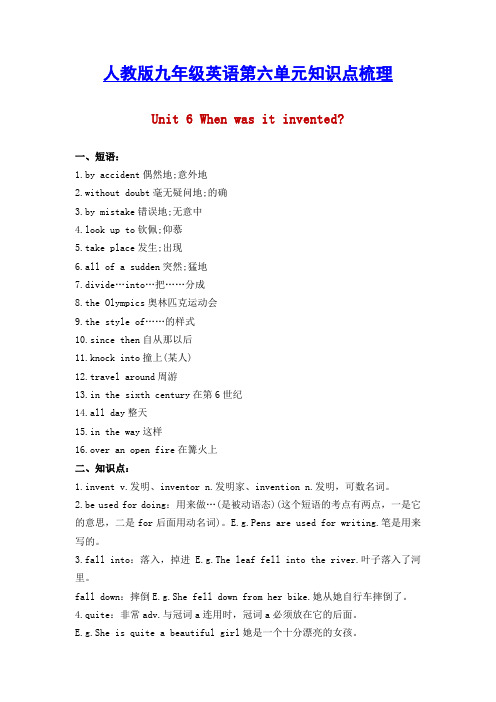
人教版九年级英语第六单元知识点梳理Unit 6 When was it invented?一、短语:1.by accident偶然地;意外地2.without doubt毫无疑问地;的确3.by mistake错误地;无意中4.look up to钦佩;仰慕5.take place发生;出现6.all of a sudden突然;猛地7.divide…into…把……分成8.the Olympics奥林匹克运动会9.the style of……的样式10.since then自从那以后11.knock into撞上(某人)12.travel around周游13.in the sixth century在第6世纪14.all day整天15.in the way这样16.over an open fire在篝火上二、知识点:1.invent v.发明、inventor n.发明家、invention n.发明,可数名词。
2.be used for doing:用来做…(是被动语态)(这个短语的考点有两点,一是它的意思,二是for后面用动名词)。
E.g.Pens are used for writing.笔是用来写的。
3.fall into:落入,掉进 E.g.The leaf fell into the river.叶子落入了河里。
fall down:摔倒E.g.She fell down from her bike.她从她自行车摔倒了。
4.quite:非常adv.与冠词a连用时,冠词a必须放在它的后面。
E.g.She is quite a beautiful girl她是一个十分漂亮的女孩。
5..pleased:adj.高兴的、满意的。
表示外部因素引起人发自内心的欣慰和愉快; pleasant:adj.令人愉快的、舒适的。
指天气、时间、旅行令人高兴和愉快; please:v.使高兴,使同意。
6.battery-operated:adj.电池控制的,是名词+动词的运动分词构成的合成形容词。
人教版英语九年级全册单元unit 6 知识点+测试卷+思维导图

Unit 6 When was it invented?1.重点词汇:style, project, pleasure, website, pioneer, ruler, smell,doubt, fridge, earthquake, biscuit, cookie, instrument, customer, basket, hero...2. 短语归纳:1.It's my pleasure.= My pleasure. 我的荣幸2.seem+to+动词原形好像做某事3.such a great invention 如此伟大的一项发明4.think of = think about 想到,考虑5.in our daily lives 在我们的日常生活中6.in my daily life在我的日常生活中7.have a point 有道理8.by accident 偶然地,意外地9.over an open fire 在篝火上10.it mentioned that 它提到11.It is said that 据说12.It is believed that人们相信13.fall into(过去式fell into)=drop into掉进…14.in the 19th century 在19世纪15.spread to other countries 传播到其他国家16.at a low price 以很低的价格17.bring(brought) sth. to sp. 把某物带到某处18.all of a sudden 突然地3. 必背典句:1.-When was the zipper invented? 拉链是什么时候被发明的?-It was invented in 1893. 它是1893年被发明的。
2. -Who was it invented by? 它是被谁发明的?-It was invented by Whitcomb Judson. 它是由惠特科姆·朱德森发明的。
人教版九年级英语第六单元复习课件

3. 篮球不仅已经成为一项非常好玩的运动项目, 而且也变成了 一项极具观赏价值的运动项目。 Basketball has__________ __________ become a popular sport__________ __________, __________it has also become a popular sport__________ __________ . 4. 这些明星(的成功)激励着年轻人刻苦训练来实现他们的梦想。 These stars__________ young people__________ __________ hard__________ __________ their dreams. 答案: 3. not only; to play; but; to watch 4. encourage; to work; to achieve
III. 句型填词 1. 薯片是无意中被发明的。 Potato chips__________ __________ __________ __________ . 2. 薯片是一个名叫乔治·克拉姆的厨师发明的。 Potato chips__________ __________ __________ a chef__________ George Crum. 3. 顾客认为土豆不够薄。 The customer thought the potatoes were not__________ ______. 答案: 1. were invented by mistake 2. were invented by; called 3. thin enough
答案: 1. the Olympics 2. divide. . . into 3. look up to
人教版九年级英语第六单元知识点总结

人教版九年级英语第六单元知识点总结Unit6 When was it invented?一.单词XXX not only…but also look up to XXX.My camera XXX.XXX.XXX?When was your camera XXX?二1.in style/out of style2. please v媚谄;请;→pleasure n舒畅→pleased adj.(人)兴奋的→pleasant adj.(物)使人舒畅的(1)With pleasure.我的侥幸(对方提出请求,应允对方的用语。
未供给匡助前。
)(It is )a pleasure/(It is )my pleasure.我的侥幸(是对方称谢时的答语。
供给匡助后。
)--Can you help me carry the box.--With pleasure./I would love to./No problem.--Thank you--(It is )a pleasure/(It is )my pleasure.(2)be pleased to do XXX舒畅做某事XXX对….惬意It’s my _____________(please) to help you.他对这辆车很惬意。
_____________________________.(3)What pleased you best?3.XXX it.(1)--I am sorry.-- XXX it.(2)—Thank you--XXX it.4.XXX chanceby XXXXXX5.XXX几乎,接近。
常可替换。
(1)但有very pretty not润饰时大概详细数字前经常利用nearly.语Not XXX远非,完全不very(pretty) nearly简直(2)almost可用于none no never nobody nothing等否定词之前,但XXX(计划,必然)/happen(偶然)均无被动。
- 1、下载文档前请自行甄别文档内容的完整性,平台不提供额外的编辑、内容补充、找答案等附加服务。
- 2、"仅部分预览"的文档,不可在线预览部分如存在完整性等问题,可反馈申请退款(可完整预览的文档不适用该条件!)。
- 3、如文档侵犯您的权益,请联系客服反馈,我们会尽快为您处理(人工客服工作时间:9:00-18:30)。
黄金笔记6
九年级上册第6单元
单元语法
考情分析:本单元还是在讲被动语态,主要在单选中与动词时态混合考查,在写作与阅读中也常会用到。
1.讲解:一般过去时被动语态的基本构架:was /were+ .(本单元语法)
现将动词的被动语态归纳如下——
一般现在时被动语态:am/is/are + .
一般过去时被动语态:was /were+ .
一般将来时被动语态:will/shall be +.
现在进行时被动语态:am/is/are+being+.
过去进行时被动语态:was/were+being+.
现在完成时被动语态:have/has+been+.
过去完成时被动语态:had+been+.
过去将来时被动语态:should/would +be+.
情态动词的被动语态:can/should/must/could/may+be+.(第七单元语法)
2.被动语态在什么情况下使用?
A.不知道或没有必要说明动作的执行者是谁时.
We haven’t been told about it.没人通知我们这件事
B.强调动作的承受者(这时可带由by引起的短语)
The book was written by Mo Yan.
C.不愿说出动作的执行者是谁
He was asked to give a speech about how to study English well.
3.被动语态的注意事项:
be 结构没有被动语态
B.主句中宾语是反身代词的没有被动语态
C.不及物动词没有被动语态
重点词法
1.invent 动词,发明;inventor 名词,发明家;invention 名词,发明
2.【了解】在英语中,除了名词所有格“XX’s”表示“···的”之外,of也有“···的”意思。
比如the style of,意为“···的.样式/风格”,the popularity of,意为“···的.普及”
style流行的,时髦的;out of style过时的
a list列清单
is said that,据说···常见的类似词组还有it is believed that···人们认为···;it is reported that···据报告···;it is known that···众所周之···;it is supposed that···据猜测···
accident =by chance 偶然地,意外地
into落入,陷入。
比较容易搞混淆的还有:fall down摔倒,fall off掉下,fall asleep 入睡
8.辨析:remain是动词,保持不变/仍然是;remind动词,提醒,remind to do sth,remind···of。
词组/单词词性意思用法
some time 名词短语一段时间常与延续性动词连用,对它提问用how
long
sometimes 频度副词有时表示动作发生的频率,多与一般现在时连
用,它可位于句首、句中、句末
some times 名词短语几次,几倍其中time是可数名词,对它提问用how
many times
sometime 副词某时表示某个不确切或不具体的时间,常用于
过去时或将来时,对它提问用when She comes to visit us sometimes.她有时来看望我们
Lucy has been to Beijing some times.露西已经去过北京几次了
Jack will leave for America sometime next week.杰克将在下周某个时间动身去美国
place发生,出现
11.【了解】英语中如何表达世纪?如the 1870s ,意为19世纪70年代
doubt= there is no doubt that+句子毫无疑问的
····(low/high)price 意为“以(低价/高价)····的价格”··into··把···翻译成····translator名词,翻译家;translation名词,翻译
of a sudden突然,猛地=suddenly
mistake无意中,错误地
深受喜爱的,复合形容词
···into···把····分成·····
···from···阻止····做····
of/about 梦想···向往····(of/about是介词,后面的动词用-ing 形式)
up to 倾佩/仰慕/抬起头看
sb to do sth鼓励某人做某事
23.【理解】thousand与基数词(one,two,three等)连用时必须用单数形式且后面不加of → two thousa nds(×)two thousands of (×) two thousand of (×) 即:thousands of 只表示大概的数字,意为“数以千计的”,这时可以在-s,后面有介词of ,但绝对不能与数词连用。
话题作文
本单元的中心话题是inventions,主要谈论发明的历史。
写这类作文要围绕下面几个方面:①谁发明的?②什么时候发明的?③用来做什么的?④怎样被发明的?写作时,一般过去时的被动语态一定要熟练且正确使用。
对最重要的发明介绍
要点提示素材串联(参考词汇、句型)
1.介绍这项发明(简要叙述)【用一般过去时】发明的时间、地点、发明者等(be invented by sb,be invented in)
2.发明的用途(重点阐述)【用一般过去时】发明被用来做什么(be used for doing sth或be used to do sth
3.发明的优缺点(重点阐述)【要用一般现在时】①优点(change the way of,be good for)
②缺点(have/has disadvantages,be bad for)
以“I want to invent ______"为题,写一篇不少于60个词的短文,标点符号不占格
参考词汇: can be used to ...
will be exciting/necessary/helpful ...
范文:
I Want To Invent A Family Doctor Robot
I want to invent a family doctor robot, which can be used to cure(治愈) the illness without going out of their home. As far as I’m concerned(在我看来), it will be helpful and useful because of the following reasons:
First, you can see the doctor immediately at home when you feel sick or get hurt. It can save us a lot of time, especially in emergency situations(紧急情况下). Furthermore(而且,此外), hospitals today are always filled with patients, not everyone can be taken good care of. However, with the help of our robot doctors, you can talk to your personal doctor one to one whenever you want.
In short, family doctor robots can make great contribution to our society.
精彩亮点分析:
亮点一:全文巧用“first, furthermore, in short”等连接词,把家庭机器人医生的好处写的非常清晰,让阅卷老师一目了然。
亮点二:全文采用了定语从句、状语从句、并列句等多种长难句,为文采分增色不少。
亮点三:文中出现了“make contribution to”这些单词及词组,恰到好处地强调了家庭机器人医生的重要性,且为文采再次进行润色。
